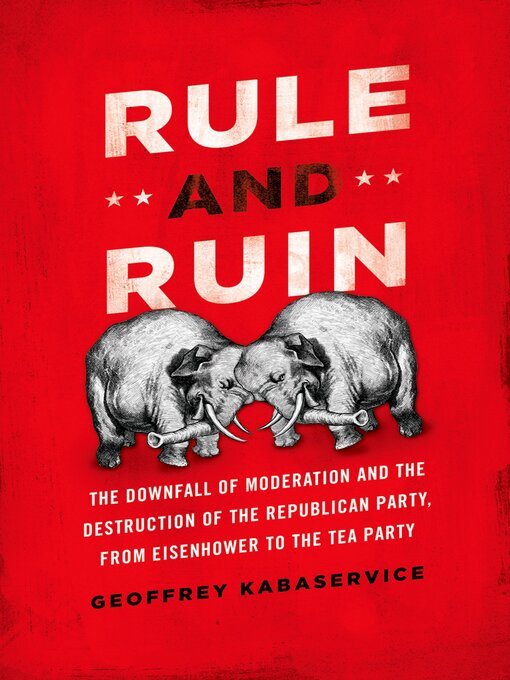- All Magazines
- Popular Magazines: Always Available
- Cooking and Food Magazines
- Craft Magazines
- News and Politics
- See all magazines collections
Rule and Ruin
The Downfall of Moderation and the Destruction of the Republican Party, From Eisenhower to the Tea Party
-
Creators
-
Series
-
Publisher
-
Release date
January 2, 2012 -
Formats
-
Kindle Book
-
OverDrive Read
- ISBN: 9780199912902
-
EPUB ebook
- ISBN: 9780199912902
- File size: 2460 KB
-
-
Languages
- English
-
Reviews
-
Publisher's Weekly
October 10, 2011
In this wistful study of the postwar Republican Party, historian Kabaservice (The Guardians) eulogizes the doomed struggle by moderate Republicans to prevent a conservative takeover of the GOP from the Eisenhower era through the Nixon administration. (The decades from Ronald Reagan’s inauguration to the Tea Party jihad flit by in a 25-page montage.) Kabaservice spotlights seldom remembered Republican moderates, including the intellectuals of the Ripon Society and politicians like George Romney, John Lindsay, and Ohio congressman Charles Whalen—Republicans who, he contends, reached out to minorities and youth, questioned the Vietnam War, and accepted the New Deal while trying to tame its excesses. (As he celebrates this lineage, it’s their enemies, the fire breathing Goldwater-Reagan-Gingrich conservatives, who supply the narrative’s energy and élan.) This is hard-core political history, full of bitter campaigns, factional infighting, and backroom deals, and Kabaservice tells it with fluency, insight, and colorful detail. Unfortunately, his focus on clashing ideologies and temperaments slights underlying interest-group politics; he says little, for example, about Republican business constituencies that benefit from conservatives’ devotion to the needs of wealthy “job-creators.” Kabaservice’s well-told but blinkered history neglects crucial reasons for the Republican flight from the middle. -
Library Journal
December 1, 2011
The best explanation for today's American "political dysfunction," writes Kabaservice, "is the transformation of the Republican Party over the past half-century into a monolithically conservative organization." He focuses on the decade after 1960, contrasting the organization building, leadership, and passion of the party's conservative wing with that of moderate Republicans, whose movement was essentially "finished" by 1970. He also looks at institutions seldom heard from today, such as the Ripon Society, or defunct, such as Advance magazine. Moderates such as Charles Percy, John Lindsay, George Romney, and especially Nelson Rockefeller are called forward here for missteps that squandered a pragmatic and enlightened legacy on issues from civil rights to health care. Richard Nixon, while enacting much of the moderate agenda, essentially killed off the moderates with polarizing rhetoric, followed by the Watergate scandal. Kabaservice goes on to assess today's all but "uniformly ideological" party. VERDICT Less analytical after the section on Nixon, Kabaservice's narrative will sustain interested general readers throughout. His research on the 1960s especially will be prized by scholars. Recommended as a complement to Nicol Rae's The Decline and Fall of the Liberal Republicans and Kabaservice's own The Guardians: Kingman Brewster, His Circle, and the Rise of the Liberal Establishment.--Bob Nardini, Nashville
Copyright 2011 Library Journal, LLC Used with permission.
-
Kirkus
October 15, 2011
A myth-dissolving account of the past state of politics in the United States and what was lost when the Republican Party was destroyed. Drawing on the rediscovered files of the Ripon Society, a centrist Republican organization, Kabaservice (The Guardians: Kingman Brewster, His Circle and the Rise of the Liberal Establishment, 2004) documents the differences between politics and ideology, and politicians and ideologues in the decline of the moderate aspects of the Republican Party. With Mitt Romney running for president and the successors of 1960s Goldwater-ism stirring in the Tea Party, the author examines what seems to be coming to pass in the current presidential cycle. He shows a tension between those in either party who wanted the country to be organized around ideological purity and a broader, inclusive openness. Kabaservice writes that New Yorker governor Thomas Dewey used to lambast the "impractical theorists" who promoted such approaches in his day, and he investigates Clif White's "Syndicate" and William Rusher of the National Review in taking on the mechanics of the organizational dirty work to clear the way for Goldwater. "White saw in movement conservatism," writes the author, "the vehicle through which to takeover the Republican Party, using tactics he had learned from the Communists." The targeted opponents were not only Republicans but also supporters of voting rights, civil rights, health care, public investment in infrastructure and education. White and Rusher provided a frame for Nixon's polarizing actions against his opponents of either party, and for the new generation of Republican youth then coming up. An engaging contribution to American political history.(COPYRIGHT (2011) KIRKUS REVIEWS/NIELSEN BUSINESS MEDIA, INC. ALL RIGHTS RESERVED.)
-
subjects
Languages
- English
Loading
Why is availability limited?
×Availability can change throughout the month based on the library's budget. You can still place a hold on the title, and your hold will be automatically filled as soon as the title is available again.
The Kindle Book format for this title is not supported on:
×- - Kindle 1
- - Kindle 2
- - Kindle 4
- - Kindle 5
- - Kindle 7
- - Kindle DX
- - Kindle Keyboard
- - Kindle Paperwhite
- - Kindle Touch
- - Kindle Voyage
Read-along ebook
×The OverDrive Read format of this ebook has professional narration that plays while you read in your browser. Learn more here.



